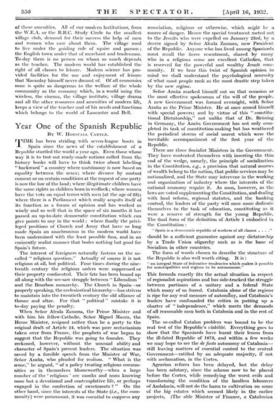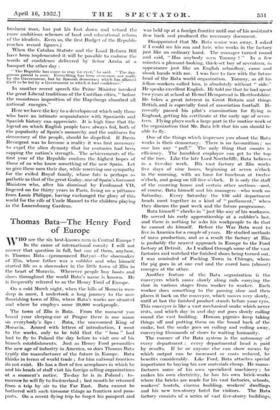Year One of the Spanish Republic
By W. HORSFALL CARTES.
has been striding with seven-league boots in -I- Spain since the news of the establishment of a Republic startled the world a year ago. Even those whose way it is to trot out ready-made notions culled from the history books will have to think twice about labelling "backward " a country where matrimony is now based on equality between the sexes; . where divorce by mutual consent or on certain conditions at the request of one party is now the law of the land; where illegitimate children have the same rights as children born in wedlock; where women have the vote on equal terms with men (at the age of 23); where there is a Parliament which really acquits itself of its function as a forum of opinion and has worked so wisely and so well that in the space of six months it has Passed an up-to-date democratic constitution which can give points to any in the world ; where finally the privi- leged positions of Church and Army that have so long made Spain an anachronism in the modern world have been undermined with the least possible fuss, and in an eminently realist manner that bodes nothing but good for Spain's future.
The interest of foreigners naturally fastens on the so- called "religious question." Actually of course it is not religious at all, but political. Four times during the nine- teenth century the religious orders were suppressed or their property confiscated. Their fate has been boundup all along with the see-saw struggle between" Liberalism" and the Bourbon monarchy. The Church in Spain—or. properly speaking, the ecclesiastical hierarchy—has striven to maintain into the twentieth century the old alliance of throne and altar. For that. " political" mistake it is to-day paying the penalty.
When Setior Alcala Zamora, the Prime Minister and with him his fellow-Catholic, Schor• Miguel Maura, 'the Home Minister, resigned rather than be a party to the original draft of Article 24, which was pure sectarianism, taken over from France,. the prophets of woe began to suggest that the Republic was going to founder. They reckoned, however, without the unusual ability and character of Spain's present leaders. The situation was saved by a forcible speech from the Minister of War, Senor Azaila, who pleaded for realism. "What is the sense," he argued, "of a policy treating religious commu- nities as in themselves .blameworthy—when a large number of the ` religious ' are monks and nuns knowing none but a devotional and contemplative life, or perhaps engaged in the confection of sweetmeats ? " On the other hand, since the interests of the State (i.e., the com- munity) were paramount, it was esseatial to suppress any association, religious or otherwise, which might be a source of danger. Hence the special treatment meted out to the Jesuits who were expelled on January 23rd, by a decree signed by Senor Aleala Zamora, now President of the Republic. Anyone who has lived among Spaniards must recall the fierce resentment, shared by many who in a religious sense are excellent Catholics, that is reserved for the powerful and wealthy Jesuit com- munity. If we bear this twist of Spanish opinion in mind we shall understand the psychological necessity of what most people rank as the most drastic step taken by the new regime.
Sehor .Azafia marked himself out on that occasion as the most effective spokesman of the will of the people. A new Government was formed overnight, with Senor Azafia as the Prime Minister. He at once armed himself, with special powers; and by virtue of this " constitu- tional Dictatorship," not unlike that of Dr. BriMing in Germany, the Azafia Government has not only com- pleted its task of constitution-making but has weathered the periodical storms of social unrest which were the inevitable accompaniment of the first year of the Republic.
There are three Socialist Ministers in the Government. They have contented themselves with inserting the thin end of the wedge, namely, the principle of socialization in the Constitution, e.g., a provision that natural sources of wealth belong to the nation, that public services may be . nationalized, and the State may intervene in the working. and organization of industry where the interests of the national economy require it. As soon, however, as the laws are voted supplementing the Constitution, and dealing with land reform, regional statutes, and the banking control, the leaders of the party will once more dedicate themselves to the task of education, constituting as it were a reserve of strength for the young Republic. The final form of the definition of Article 1 einbodied in the Constitution
" Spain is a democratic republic of workers of all classes . . ."
should be a sufficient guarantee against any dictatorship by a Trade Union oligarchy such as is the bane of Socialism in other countries: The form of words chosen to describe the structure of the Republic is also well worth citing. It is " an integral State of federative tendencies which makes it possible for municipalities and regions to be autonomous."
This formula exactly fits the actual situation in respect. of regionalist aspirations and has side-tracked the struggle- between partisans of a unitary and a federal State which many of us feared. Catalonia alone Of the regions is ripe for any real measure of autondiny, and Catalonia's leaders have confounded the critics in putting up a charter of "independence," which meets the demands of all reasonable men both in Catalonia and in the rest of Spain
' The so-called Catalan problem was, bound to be the real test of the Republic's viabilite. Everything goes to show that the Spaniards have learnt their lesson from the ill-fated Republic of 1873, and within a few weeks we may hope to see the de facto autonomy, of Catalonia— still leaving matters of essential control to the central Government—ratified by an adequate majority, if not with acclamation, in the Cortes. .
Agrarian, reform has been delayed, but the delay. has been. salutary, since the scheme now to be placed before the_ Cortes, while remedying the worst evils and transforming the condition of the landless labourers of Andalucia,,will not do the harm to cultivation on some of the big estates which seemed likely in the.. earlier projects, fl'he able Minister of Finance, .a Catalonitm business • man, has put his foot down and vetoed the more ambitious schemes of land and educational reform of the idealists. Even so, the first Budget of the Republic readies record figures.) When the Catalan Statute and the Land Reform Bill have been implemented it will be possible to endorse the words of confidence delivered by Schor Azaila at a banquet the other day:
The Republic has come to stay for ever," he said. "The dan- gerous period is over. Everything has been overcome, not really by the Government, but by Spanish democracy which has allowed itself to be hid by a Government in which it had confidence."
In another recent speech the Prime Minister invoked the great Liberal traditions of the Castilian cities, "before the monstrous imposition of the Hapsburgs absorbed all national energies." Here we have the key to a development which only those who have an intimate acquaintance with Spaniards and Spanish history can appreciate. It is high time that the legend on which English people have always fed, both of the popularity of Spain's monarchy and the unfitness for democracy of the people, should be dispelled. If Iberia Resurgent was to become a reality it was first necessary to expel the alien dynasty that for centuries had been sapping the nation's strength. The achievements of the first year of the Republic confirm the highest hopes of those of us who know something of the new Spain. Let us give these men their due, while reserving our sympathy for the exiled Royal family, whose fate is perhaps as pathetic as that of the great Godoy, one of Spain's foremost Ministers who, after his dismissal by Ferdinand VII, lingered on for thirty years in Paris, living on a pittance from Louis Philippe, having exchanged the glory of this world for the role of Uncle Manuel to the children playing in the Luxembourg Gardens.









































 Previous page
Previous page